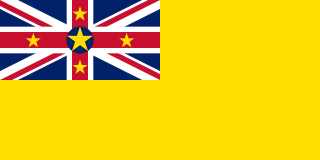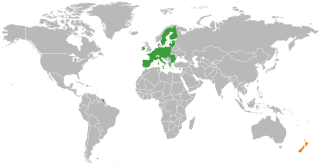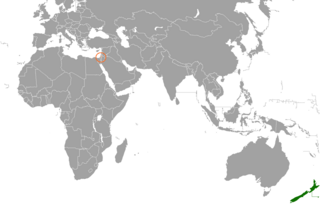Related Research Articles

The politics of New Zealand function within a framework of an independent, unitary, parliamentary democracy. The system of government is based on the Westminster system, and the legal system is modelled on the common law of England. New Zealand is a constitutional monarchy in which King Charles III is the sovereign and head of state, while his prime minister serves as the head of government.

The foreign relations of New Zealand are oriented chiefly toward developed democratic nations and emerging Pacific Island economies. Until the late 20th century, New Zealand aligned itself strongly with the United Kingdom and had few bilateral relationships with other countries. From the latter half of the 20th century, Australia has been New Zealand's most important cultural, economic and military partner. Today, the country participates in several multilateral political organisations, including Asia-Pacific Economic Cooperation, the Pacific Community, and the Pacific Islands Forum. New Zealand has been described as an emerging power; however, such a claim needs to be considered in the context of its medium-sized economy and limited military capability. The country's major political parties have generally agreed on the broad outlines of foreign policy, and the government has been active in promoting free trade, nuclear disarmament, and arms control.

The politics of Niue take place in a framework of a parliamentary representative democratic dependency, whereby the Chief Minister is the head of government, and of a non-partisan system. Niue is self-governing in free association with New Zealand and is fully responsible for internal affairs. New Zealand retains some responsibility for external affairs, in consultation with Niue. The Niue Constitution Act 1974 (NZ) vests executive authority in His Majesty the King in Right of New Zealand and the Governor-General of New Zealand. The constitution specifies that in everyday practice, it is exercised by a Cabinet of the Premier of Niue and three other ministers. The premier and ministers must be members of the Niue Assembly, the nation's legislative assembly. The Judiciary is independent of the executive and the legislature.

The United Nations General Assembly, UNGA; French: Assemblée générale des Nations unies, AGDNU is one of the six principal organs of the United Nations (UN), serving as its main deliberative, policymaking, and representative organ. Currently in its 79th session, its powers, composition, functions, and procedures are set out in Chapter IV of the United Nations Charter.

Derek Francis Quigley is a New Zealand former politician. He was a prominent member of the National Party during the late 1970s and early 1980s, and was known for his support of free-market economics and trade liberalisation. Quigley left the National Party after clashing with its leadership, and later co-founded the ACT New Zealand party.

The Realm of New Zealand is the area over which the monarch of New Zealand is head of state. The realm is not a federation but is a collection of states and territories united under its monarch. New Zealand is an independent and sovereign state that has one territorial claim in Antarctica, one dependent territory (Tokelau), and two associated states. The Realm of New Zealand encompasses the three autonomous jurisdictions of New Zealand, the Cook Islands, and Niue.

Nabil Elaraby was an Egyptian politician and diplomat who was the 7th Secretary General of the Arab League from 1 July 2011 to 3 July 2016. Elaraby also had roles in the United Nations, holding positions at the United Nations Institute for Training and Research and serving as a Permanent Representative to the United Nations.

Sir Kenneth James Keith is a New Zealand judge. He was elected to the International Court of Justice in November 2005, serving a nine-year term during the years 2006 through 2015.
Russell McVeagh is a New Zealand law firm with offices in Auckland and Wellington. It is one of New Zealand's largest law firms and is ranked highly by law firm ranking guides such as The Legal 500 and Chambers and Partners.

Israel–New Zealand relations are the foreign relations between the State of Israel and New Zealand. While Israel has an embassy in Wellington, New Zealand's embassy in Ankara, Turkey is accredited to Israel. Diplomatic relations between the two countries date back to January 1949. New Zealand has exported a mixture of agricultural and manufactured goods to Israel. In return, Israel has exported a range of manufactured goods to New Zealand. Bilateral relations between the two countries have been complicated by issues such as the 2004 Israel–New Zealand passport scandal, United Nations Security Council Resolution 2334, and the Israel-Palestine conflict.

Sir George Robert Laking was a New Zealand diplomat who served as High Commissioner to the United Kingdom, Ambassador to the United States, Secretary of Foreign Affairs and Chief Ombudsman.

Terence Christopher O'Brien was a New Zealand diplomat. He led New Zealand in 1993 to a seat on the United Nations Security Council and played a strong role in helping to reshape New Zealand's perceptions of itself as a small but fiercely independent nation in the South Pacific.

New Zealand is a founding member of the United Nations, having taken part in the 1945 United Nations Conference on International Organization in San Francisco.

The China–New Zealand relations, sometimes known as Sino–New Zealand relations, are the relations between China and New Zealand. New Zealand recognised the Republic of China after it lost the Chinese Civil War and retreated to Taiwan in 1949, but switched recognition to the People's Republic of China on 22 December 1972. Since then, economic, cultural, and political relations between the two countries have grown over the past four decades. China is New Zealand's largest trading partner in goods and second largest trading partner in services. In 2008, New Zealand became the first developed country to enter into a free trade agreement with China. In recent years, New Zealand's extensive economic relations with China have been complicated by its security ties to the United States.

Wegger Christian Strømmen is a Norwegian diplomat and politician who is the current Norwegian Ambassador to the United Kingdom. He was Norwegian Ambassador to the United States in 2007–2013.

Mahamat Zene Cherif is a Chadian diplomat and politician. He served as Minister of Foreign Affairs of Chad from December 2017 to his resignation in September 2022. before serving as the Minister of Communication for a brief stint and then being re-appointed in May 2021 to once again continue as the Minister of Foreign Affairs. He previously served as the Permanent Representative of Chad to the United Nations in New York.

United Nations Security Council Resolution 2334 was adopted on 23 December 2016. It concerns the Israeli settlements in "Palestinian territories occupied since 1967, including East Jerusalem". The resolution passed in a 14–0 vote by members of the United Nations Security Council (UNSC). Four members with United Nations Security Council veto power voted for the resolution, while the United States abstained. The resolution states that Israel's settlement activity constitutes a "flagrant violation" of international law and has "no legal validity". It demands that Israel stop such activity and fulfill its obligations as an occupying power under the Fourth Geneva Convention.

New Zealand and the European Union (EU) have solid relations and increasingly see eye-to-eye on international issues. The EU-New Zealand relations are founded on a Joint Declaration on Relations and Cooperation, first agreed in 2007. It covers not just economic relations, but broader political issues and cooperation.

New Zealand–Palestine relations refer to foreign relations between New Zealand and the State of Palestine. New Zealand does not recognise Palestine as a country.